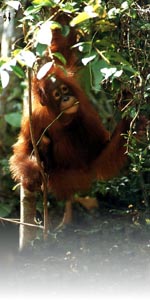Young female chimps are faster and better learners than young male chimps, suggests a new study, echoing learning differences seen in human girls and boys. Young female chimps outlearn their brothers
While young male chimps pass their time playing, young female chimps carefully study their mothers. As a result, they learn how to fish for tasty termite snacks over two years before the boys.
Elizabeth Lonsdorf, now at Lincoln Park Zoo in Chicago, US, and colleagues at the University of Minnesota, Saint Paul, spent four years watching how young chimpanzees in the Gombe National Park in Tanzania learned "cultural behaviour".
The sex differences in learning behaviour were "consistent and strikingly apparent", says the team. The researchers point out that similar differences are seen in human children with regard to skills such as writing.
"A sex-based learning difference may therefore date back at least to the last common ancestor of chimpanzees and humans," they write in the journal Nature.
Late starters
Chimps make flexible tools from vegetation and then insert them into termite mounds, extract them and then munch the termites clinging onto the tool. The researchers used video cameras to record this feeding behaviour and found that each chimp mother had her own technique, such as how she used tools of different lengths.
Analysis of the six infants whose aged were known showed that girl chimps were an average of 31 months old when they succeeded in fishing out their own termites, where the boy chimps were aged 58 months on average.
Females were also more skillful at getting out more termites with every dip and used techniques similar to their mothers' where the males did not.
Instead of studying their mothers, the boy chimps spent a significantly greater amount of time frolicking around the termite mound. Behaviours such as playing or swinging might help the male infants later in life when typically male activities like hunting or fighting for dominance become important, suggest the researchers.
Protein source
Lonsdorf adds that there are just two main sources of animal protein for chimps - the termites or colobus monkeys.
"Mature males often hunt monkeys up trees, but females are almost always either pregnant or burdened with a clinging infant. This makes hunting difficult," she says. "Adult females spend more time fishing for termites than males."
So becoming proficient at termite fishing could mean adult females eat better. "They can watch their offspring at the same time. The young of both sexes seem to pursue activities related to their adult sex roles at a very young age."
Journal reference: Nature (vol 428, p 715)
Shaoni Bhattacharya
HOME
Primate Info
Animal Medicine
Primate Species
Animal Rights FAQ
Chimpanzee Genome
Chimpanzee Hotlinks
Retired Chimpanzees
Self-medicating lemurs
Chimpanzee Fact Sheet
Monkey Sense of Justice
Are Chimpanzees Human?
Chimpanzees: First Contact
'Drunk-and-disorderly' chimpanzees
dave@bltc.com
